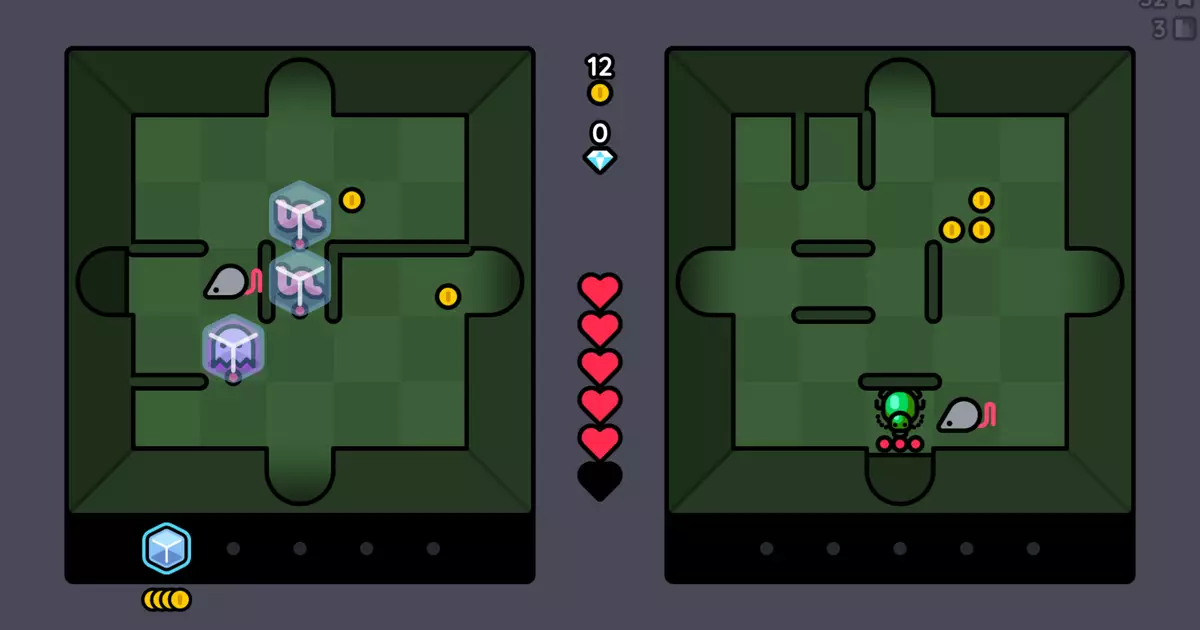In an era saturated with easy-to-play, surface-level entertainment, Rat King dares to challenge gamers with a profound level of strategic depth. Unlike conventional puzzle games that simply reward pattern recognition or reflexes, this title elevates the genre by demanding mastery over simultaneous, dual-character management. Controlling two rodents in separate, yet interconnected, dungeons compels players to think in terms of carefully choreographed sequences. This isn’t just about avoiding enemies; it’s about balancing multiple objectives across parallel realities, forcing a shift in perspective that can be revelatory for players craving complexity and nuance.
The core mechanic—managing two characters with a shared health pool—stretches traditional notions of risk and reward. Each rodent faces a unique environment, with room layouts and enemy placements that rarely align. Success, therefore, hinges on the ability to anticipate how one move impacts both characters, often requiring split-second decisions to keep both alive and progressing. This mechanic is inherently punishing, yet deeply satisfying, because it fosters a sense of mastery born from patience and strategic foresight. The game transforms failure into a learning process, compelling players to refine their approach with each attempt, which ultimately deepens engagement and investment.
Innovative Layering of Challenges and Rewards
What sets Rat King apart from similar titles is its layered approach to difficulty and progression. Coins scattered across rooms serve as incentives but are also crucial tools for advancement—players can spend their loot on items that temporarily alter gameplay mechanics, providing essential tactical advantages. For instance, an ice cube freezes enemies in place, offering respite amid chaos, while the swirling purple object rewires control schemes, granting new ways to navigate treacherous rooms.
These items aren’t mere power-ups; they are strategic tools that encourage experimentation. Deciding when to deploy freezing traps or reorient controls becomes part of a larger calculus—do you risk running out of resources or triggering aggressive enemies? The risk-reward system ensures every decision has weight, elevating the gameplay from mere reflex-based action to thoughtful planning. The game’s design cleverly embraces these constraints, turning potential limitations into opportunities for creative problem-solving.
Elegant Design and Challenging Constraints
A key insight into Rat King’s brilliance lies in its design philosophy. The game enforces constraints—like punishing wall-bouncing or careless synchronization—that serve as gentle yet firm guides for emergent gameplay. Ghosts, for example, act as environmental consequences of poor navigation, adding a spectral layer of peril that enriches the game world. These seemingly soft constraints compel players to develop a disciplined approach, encouraging finesse over brute-force tactics.
Furthermore, the split-screen mechanic allows players to manage two separate yet interconnected challenges, providing flexibility in navigation and decision-making. Moving one rodent independently to reposition or evade enemies creates a dynamic gameplay rhythm that keeps players engaged. It promotes a meta-awareness: thinking several steps ahead, understanding how actions in one dungeon ripple across the other. This interconnectedness is what transforms Rat King from a simple puzzle game into a compelling tactical arena—one that rewards patience, planning, and adaptive thinking.
Innovative Inspiration and Future Potential
While Rat King nods to predecessors like Michael Brough’s 868-Hack, it carves its own identity through sleek mechanics and thematic coherence. Its minimalist pixel art belies a complex web of strategic possibilities, reminiscent of classic roguelikes but with a twist—an emphasis on orchestrated simultaneity. It stands as a testament to how small games, when crafted with care and ingenuity, can achieve a profound depth often missing from bigger productions.
In essence, Rat King exemplifies the potential of indie design to push boundaries and redefine what puzzle or tactical gameplay can be. It challenges us not just to solve problems, but to think about multi-layered systems, anticipate consequences, and embrace the chaos of simultaneous decision trees. For gamers seeking a genuine mental workout wrapped in a charming, if slightly mischievous, package, Rat King is a revelation—an invitation to rediscover the joy of strategic mastery disguised under the guise of adorable rodents.

